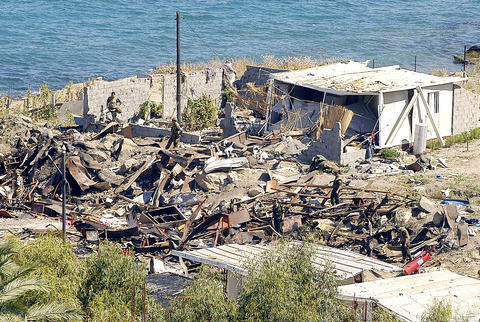A car bomb killed at least 28 coast guard officers in Algeria just days after a blast ripped through a crowd waiting for the president. The bombings were seen as a show of strength by the country's main extremist group, which has gained force after linking up with al-Qaeda.
Though there was no claim of responsibility in either attack, al-Qaeda's North African affiliate has carried out a spate of bombings that shattered the Algerian government's efforts -- successful until recently -- to restore calm after a 15-year Islamist insurgency.
Both bombings targeted symbols of the Algerian state at a time when the government has toughened its tone and intensified military crackdowns on Islamic militants hiding out in remote scrubland. Algerian Interior Minister Noureddine Yazid Zerhouni warned terrorists on Friday that they have "one choice: Turn themselves in or die."

PHOTO: AP
In the most recent blast, on Saturday, explosives planted in a van ripped through barracks in the northern coastal town of Dellys, about 50km from Algiers.
The bombing appeared timed to kill as many officers as possible, when they were grouped together to raise the flag.
It was not clear whether the bomber was killed in the blast or escaped.
The 28 victims were all coast guard officials, who are part of Algerian armed forces, hospital authorities said, speaking on condition of anonymity because they were not authorized to speak to the media. About 20 others were injured.
The bombing was Algeria's deadliest since April, when triple suicide bombings against the prime minister's office and a police station killed 32.
Another attack last week killed at least 22 in a crowd of people in eastern Algeria who were waiting to see President Abdelaziz Bouteflika, who has devoted his eight years in office to ending violence by insurgents and whose government is a US ally in the campaign against terrorism.
There was speculation that Bouteflika was the intended target in the Thursday attack, though officials kept silent on the question.
Algeria's insurgency broke out in 1992 after the army canceled legislative elections that a now-banned Islamic fundamentalist party appeared poised to win.
Up to 200,000 people were killed in the ensuing violence.
Widespread killing was on the wane until recently, but violence surged earlier this year after Algeria's Salafist Group for Call and Combat (GSPC), officially linked up with al-Qaeda, adopting the name al-Qaeda in Islamic North Africa.
The group claimed responsibility for other attacks this year, including the triple suicide attacks in April and another blast in July, when a suicide bomber blew up a refrigerated truck inside a military encampment, killing 10 soldiers.
Besides targeting the military and symbols of the state, militants have also killed foreigners in smaller-scale attacks.
Over the years, Bouteflika's government has offered amnesty for scores of reformed militants while waging tough military crackdowns on those who refused the offers -- a strategy that Bouteflika promises will reconcile the country.
Those tactics have dramatically reduced the number of fighters, and the GSPC may have joined up with al-Qaeda partly as a way to survive and attract a new generation of fighters.

Archeologists in Peru on Thursday said they found the 5,000-year-old remains of a noblewoman at the sacred city of Caral, revealing the important role played by women in the oldest center of civilization in the Americas. “What has been discovered corresponds to a woman who apparently had elevated status, an elite woman,” archeologist David Palomino said. The mummy was found in Aspero, a sacred site within the city of Caral that was a garbage dump for more than 30 years until becoming an archeological site in the 1990s. Palomino said the carefully preserved remains, dating to 3,000BC, contained skin, part of the

‘WATER WARFARE’: A Pakistani official called India’s suspension of a 65-year-old treaty on the sharing of waters from the Indus River ‘a cowardly, illegal move’ Pakistan yesterday canceled visas for Indian nationals, closed its airspace for all Indian-owned or operated airlines, and suspended all trade with India, including to and from any third country. The retaliatory measures follow India’s decision to suspend visas for Pakistani nationals in the aftermath of a deadly attack by shooters in Kashmir that killed 26 people, mostly tourists. The rare attack on civilians shocked and outraged India and prompted calls for action against their country’s archenemy, Pakistan. New Delhi did not publicly produce evidence connecting the attack to its neighbor, but said it had “cross-border” links to Pakistan. Pakistan denied any connection to

TRUMP EFFECT: The win capped one of the most dramatic turnarounds in Canadian political history after the Conservatives had led the Liberals by more than 20 points Canadian Prime Minister Mark Carney yesterday pledged to win US President Donald Trump’s trade war after winning Canada’s election and leading his Liberal Party to another term in power. Following a campaign dominated by Trump’s tariffs and annexation threats, Carney promised to chart “a new path forward” in a world “fundamentally changed” by a US that is newly hostile to free trade. “We are over the shock of the American betrayal, but we should never forget the lessons,” said Carney, who led the central banks of Canada and the UK before entering politics earlier this year. “We will win this trade war and

Armed with 4,000 eggs and a truckload of sugar and cream, French pastry chefs on Wednesday completed a 121.8m-long strawberry cake that they have claimed is the world’s longest ever made. Youssef El Gatou brought together 20 chefs to make the 1.2 tonne masterpiece that took a week to complete and was set out on tables in an ice rink in the Paris suburb town of Argenteuil for residents to inspect. The effort overtook a 100.48m-long strawberry cake made in the Italian town of San Mauro Torinese in 2019. El Gatou’s cake also used 350kg of strawberries, 150kg of sugar and 415kg of